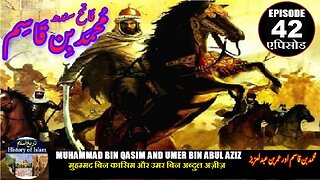Premium Only Content

What was next target about Muslim Fiqah, خلیفہ القادر بلہ کی مسلم فقہ کے بارے میں اگلا ہدف کیا تھا؟
@islamichistory813 #IslamicLaw #Caliphate #HistoricalAnalysis
What was next target about Muslim Fiqah of Al-Qadir Billa, 25th Caliph of Abbassid Caliphate.
Dekhti aankhon aur suntay kanon ko Asslamoalaikum, sisters brothers friends and elders This video offers an in-depth analysis of Al-Qadir Billa, the 25th Caliph of the Abbasid Caliphate, focusing on his influence on Muslim Fiqah. We are describing the key initiatives and reforms he implemented during his rule, as well as the challenges he faced in advancing Islamic jurisprudence. also we are describing the next targets that guided his vision for a more cohesive legal framework within the Muslim community.
Al-Qadir's next target was the rationalist Mu'tazilite school, which had enjoyed the protection of the Buyids and whose members had often held the post of chief qadi in Baghdad under Buyid rule. Mu'tazilism had in the past been supported by Abbasid caliphs, most notably al-Ma'mun, who even instituted the Inquisition-like mihna to persecute the traditionalists who refused to accept the Mu'tazilite doctrine of Quranic createdness. In the event, the persecution not only failed, but backfired: the mihna was suspended, and the traditionalist Hanbali school emerged with its prestige strengthened and its doctrines more influential than before. In 1017, al-Qadir unequivocally sided with his predecessors' opponents: he condemned Mu'tazilite as well as Shi'a doctrines, prohibited the teaching of Mu'tazilite doctrines or theological debate (kalam), and ordered those Hanafi jurists who had shown Mu'tazilite tendencies to do penance, on pain of corporal punishment and exile. Shortly after, on 27 January 1019, inspired by Hanbali ideas, the caliph issued a decree, the Risala al-Qadiriyya ('Epistle of al-Qadir'), which for the first time explicitly formulated Sunni doctrine. The decree condemned Shi'a, Mu'tazilite, and even Ash'arite doctrines, and affirmed the veneration of the first four caliphs (the 'Rashidun') and of the Companions of Muhammad, as an obligation for all Muslims, against Shi'a beliefs that the first three caliphs had been illegitimate, as they had deprived Ali (the fourth caliph) of his rightful inheritance. All speculative theological debate was prohibited, along with the denigration of any of the Companions or even examination of the disputes in which they had been involved, and which had given rise to the first schisms in Islam. Quranic createdness was again singled out as heresy, its supporters branded as infidels "whose blood may legitimately be shed".
In 1029, al-Qadir reiterated and reinforced his theological doctrines; In three sessions on 2 September, 2 October, and 11 November, each more lengthy and elaborate than the previous one and held before an assembly of Alids, jurists, and other notables, the caliph once again denounced Mu'tazilism, condemned the doctrine of Quranic createdness, and reaffirmed the special status of the Rashidun caliphs and the need of "enjoining good and forbidding wrong". This coincided with the campaigns of Mahmud of Ghazni against the Shi'a, the Buyids (Ray was captured in 1029 and Kirman attacked two years later), and the Ghaznavid expansion into India, but also with the presence of Jalal al-Dawla on the Buyid throne, who was dependent on the caliph's goodwill. Thus al-Qadir was able to secure the dismissal of pro-Alid preachers, and the protection by armed escort of Sunni ones that were threatened by Shi'a partisans.
Friends sisters brothers tomorow we will be described Death and succession of Al-Qadir Billa, 25th Caliph of Abbasid Caliphate, So permission for upto tomorow. Allah Hafiz
============================
-
 10:01
10:01
ISLAMIC HISTORY
9 hours agoMuhammad bin Qasim Episode 42 Bin Qasim and Umar Bin Abdul Aziz محمد بن قاسم اور عمر بن عبدالعزیز
21 -
 LIVE
LIVE
vivafrei
1 hour agoNYC Might Get a Socialist "Queer"-Obsessed, Defund-the-Police Mayor! Fake News & Fake Leaks? & More!
5,672 watching -
 LIVE
LIVE
Dr Disrespect
3 hours ago🔴LIVE - DR DISRESPECT - THE BEST IS BACK!
2,811 watching -
 LIVE
LIVE
Pop Culture Crisis
30 minutes agoAndrew Tate Vs Bonnie Blue, Katy Perry Mid-Life Crisis, Kim Kardashian Becomes BRATZ Doll | Ep. 864
414 watching -
 LIVE
LIVE
The Quartering
2 hours agoLiver King ARRESTED, FBI Investigating Gender Clinics, Diddy Charges Dropped Iran Damage Fake News
10,806 watching -
 1:06:55
1:06:55
Russell Brand
3 hours agoThe Truth About Iran, Israel & U.S. War – Erik Prince Breaks It Down - SF603
117K18 -
 LIVE
LIVE
Crypto Power Hour
8 hours ago"The Battle for the Future of Banking: SWIFT vs. Blockchain"
119 watching -
 LIVE
LIVE
Jeff Ahern
28 minutes agoNever Woke Wednesday with Jeff Ahern
74 watching -
 LIVE
LIVE
Mally_Mouse
4 hours agoLet's Play!! - Wii Sports Resort - 16th ANNIVERSSARY!
83 watching -
 16:57
16:57
Bearing
6 hours agoWorld’s CREEPIEST Trans TikToker Facing PRISON TIME!? 💥 The Disney Bathroom Predator 👮
1.48K21